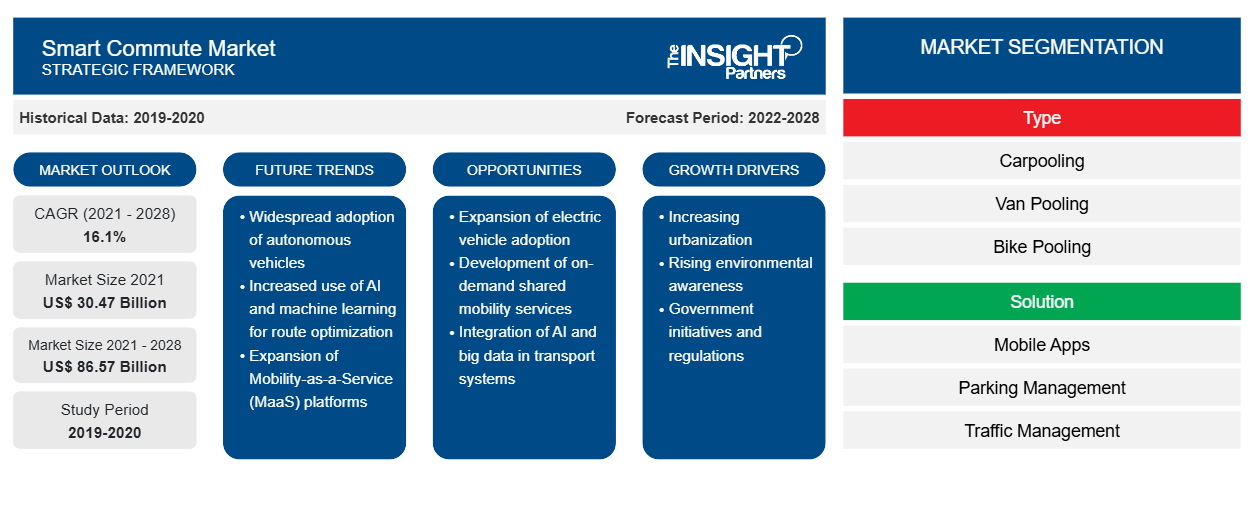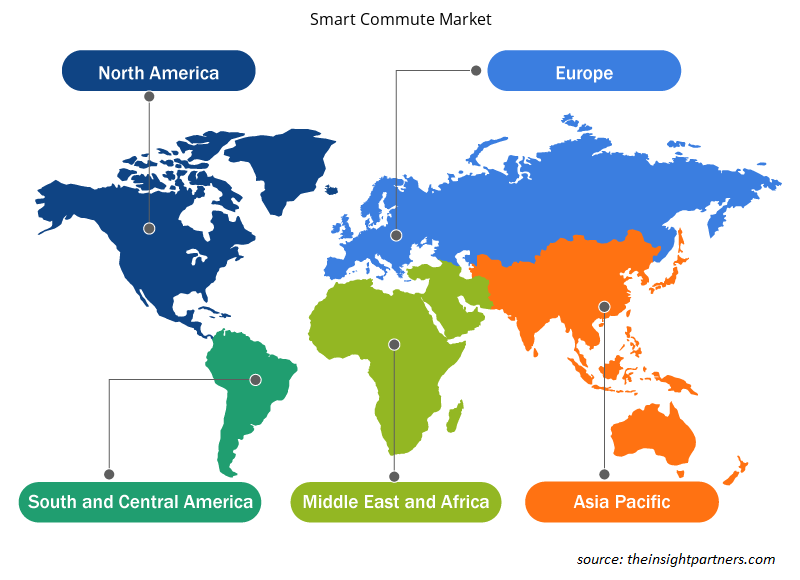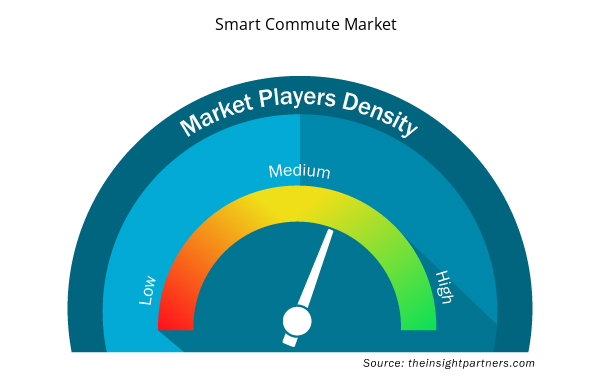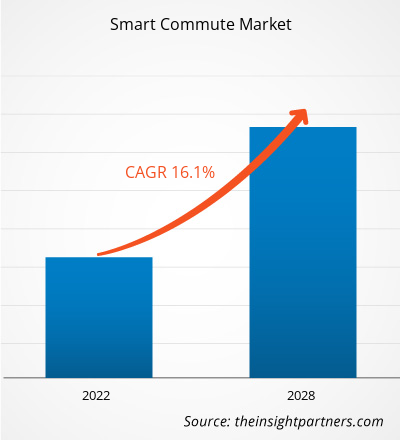The smart commute market is expected to grow from US$ 30,469.49 million in 2021 to US$ 86,568.73 million by 2028; it is estimated to grow at a CAGR of 16.1% from 2021 to 2028.
Smart commuting is defined as regularly traveling via carpooling, vanpooling, biking, bicyclists, or taking the metro. Public transit companies, governments, and other stakeholders have developed a complete strategy that considers smart travel and shares it with the public to construct more powerful transportation in metropolitan regions. Smart commuting positively impacts the environment by decreasing traffic congestion and reducing greenhouse gas emissions.
Carpooling, bike-sharing, vanpooling, and other environmental-friendly commuting options are available through smart commute services. It provides office workers with a transportation option to choose a more effective commute path that reduces traffic congestion and transportation expenditures. One of the factors boosting the growth of the smart commute market is the growing number of city dwellers, leading to an increase in generational rates. Sharing transportation services have gained universal acceptability and are being encouraged by governments and environmental bodies as it helps reduce emissions. It allows for fewer private autos, which is expected to fuel the growth of the smart commute market in the coming years.
In North America, the need for smart commutes has been fuelled by an increasing preference for carpool services among office commuters which would alleviate traffic congestion and prevent environmental damage. Furthermore, a rise in the tourism industry, technological advancements, and favorable government policies are other factors driving the growth of the North America smart commute market. In Europe, the rise in the trend of mobility-as-a-service and the increase in the user base of ride-sharing services are expected to create lucrative opportunities for the market players.
In Europe, due to growing concerns about global warming, road congestion, and reliance on foreign energy, smart commuters are becoming more popular. The practice of levying toll rates on automobiles with a single occupant, which was imposed in 2012, has resulted in a huge increase in the use of smart commutes by European consumers.
Customize This Report To Suit Your Requirement
You will get customization on any report - free of charge - including parts of this report, or country-level analysis, Excel Data pack, as well as avail great offers and discounts for start-ups & universities
Smart Commute Market: Strategic Insights

- Get Top Key Market Trends of this report.This FREE sample will include data analysis, ranging from market trends to estimates and forecasts.
:
Customize This Report To Suit Your Requirement
You will get customization on any report - free of charge - including parts of this report, or country-level analysis, Excel Data pack, as well as avail great offers and discounts for start-ups & universities
Smart Commute Market: Strategic Insights

- Get Top Key Market Trends of this report.This FREE sample will include data analysis, ranging from market trends to estimates and forecasts.
Impact of COVID-19 Pandemic on Smart Commute Market
The COVID-19 outbreak had a significant impact on the transportation sector. The demand for carpooling and vanpooling services reduced globally in 2020 due to the COVID-19. The worldwide smart commute market saw a considerable decline in revenue generation in 2020 compared to 2019, partly due to the lockdowns and customers' reluctance to use ride-sharing services even after the regulations were lifted. Ride-sharing firms are always attempting to maintain driver and passenger confidence in terms of safety and sanitation.
Market Insights– Smart Commute Market
Increasing Trend of Mobility-as-a-Service
People who are not capable of purchasing a car can experience seamless travel through mobility services. According to the Bureau of Transportation Statistics, the average cost of owning and operating a vehicle is roughly $8,858, assuming 15,000 kilometers of drive per year. Mobility-as-a-service reduces these costs for the user by maximizing the use of transportation services such as carpooling and ride-hailing. It also reduces traffic congestion and overall automobile emissions in cities. As a result, digitally-enabled carpooling and ride-hailing efficiently manage transport demands and provide a convenient and environmentally friendly alternative to private automobile ownership. Moreover, according to statistics, 55% of the world's population currently lives in cities, and estimations suggest that by 2050, roughly 68% of the population will be living in cities. The rapid pace of urbanization is already leading to traffic congestion. The mobility as a service (MaaS) concept may be a better choice for reducing traffic congestion by making greater use of existing public and private transportation infrastructure. The urgent demand for effective solutions to handle traffic in smart cities in a faster, less expensive, and more convenient manner is expected to fuel MaaS market growth by 2028. Therefore, the increasing trend of mobility as a Service (MaaS) is expected to fuel the growth of the global smart commute market.
Type-Based Smart Commute Market Insights
Based on type, the smart commute market is segmented into carpooling, vanpooling, bike pooling, metro, and others. The carpooling segment is anticipated to hold a significant share in the global smart commute market, and it is expected to grow at the highest CAGR. The smart commute is defined as regularly traveling from one point to another via carpooling, vanpooling, biking, bicyclists, or taking the metro.
Solution-Based Smart Commute Market Insights
Based on solution, the smart commute market is segmented into mobile apps, parking management, traffic management, and others. The mobile apps segment is anticipated to hold a significant share in the global smart commute market, and it is expected to grow at the highest CAGR. There is a growing usage of mobile applications in automobile travel mode to reduce travel time, cost, and vehicle emissions.
End User-Based Smart Commute Market Insights
Based on end user, the smart commute market is bifurcated into personal and enterprises. The enterprises segment is anticipated to hold a significant share in the global smart commute market, and it is expected to grow at a higher CAGR.
Smart Commute Market Regional Insights
The regional trends and factors influencing the Smart Commute Market throughout the forecast period have been thoroughly explained by the analysts at Insight Partners. This section also discusses Smart Commute Market segments and geography across North America, Europe, Asia Pacific, Middle East and Africa, and South and Central America.

- Get the Regional Specific Data for Smart Commute Market
Smart Commute Market Report Scope
| Report Attribute | Details |
|---|---|
| Market size in 2021 | US$ 30.47 Billion |
| Market Size by 2028 | US$ 86.57 Billion |
| Global CAGR (2021 - 2028) | 16.1% |
| Historical Data | 2019-2020 |
| Forecast period | 2022-2028 |
| Segments Covered |
By Type
|
| Regions and Countries Covered | North America
|
| Market leaders and key company profiles |
Smart Commute Market Players Density: Understanding Its Impact on Business Dynamics
The Smart Commute Market market is growing rapidly, driven by increasing end-user demand due to factors such as evolving consumer preferences, technological advancements, and greater awareness of the product's benefits. As demand rises, businesses are expanding their offerings, innovating to meet consumer needs, and capitalizing on emerging trends, which further fuels market growth.
Market players density refers to the distribution of firms or companies operating within a particular market or industry. It indicates how many competitors (market players) are present in a given market space relative to its size or total market value.
Major Companies operating in the Smart Commute Market are:
- BlaBlaCar
- CommuteSmart
- Enterprise Holdings Inc
- ePoolers Technologies Pvt. Ltd
- Golden Concord Holdings Limited
Disclaimer: The companies listed above are not ranked in any particular order.

- Get the Smart Commute Market top key players overview
Players operating in the smart commute market are mainly focused on the development of advanced and efficient products.
- In January 2022, Tummoc, a multi-modal mobility firm, intends to expand operations to ten other cities by 2022, including Delhi and Mumbai.
- In April 2021, A city-based mobility firm has built an app platform that integrates routes with prices for the first time, combining the bus, metro, Uber, Yulu, and other last-mile choices.
Company Profiled
:
- BlaBlaCar
- CommuteSmart
- Enterprise Holdings Inc
- ePoolers Technologies Pvt. Ltd
- Golden Concord Holdings Limited
- Oakland Smart Commute
- Quick Ride
- Transhelp Technologies Pvt Ltd
- Uber Technologies Inc.
- Smart Commute
- Historical Analysis (2 Years), Base Year, Forecast (7 Years) with CAGR
- PEST and SWOT Analysis
- Market Size Value / Volume - Global, Regional, Country
- Industry and Competitive Landscape
- Excel Dataset


- Sodium Bicarbonate Market
- Authentication and Brand Protection Market
- Virtual Event Software Market
- Small Molecule Drug Discovery Market
- Non-Emergency Medical Transportation Market
- Sweet Potato Market
- Oxy-fuel Combustion Technology Market
- Foot Orthotic Insoles Market
- Lymphedema Treatment Market
- Europe Tortilla Market

Report Coverage
Revenue forecast, Company Analysis, Industry landscape, Growth factors, and Trends

Segment Covered
Type, Solution, and End User

Regional Scope
North America, Europe, Asia Pacific, Middle East & Africa, South & Central America

Country Scope
Argentina, Australia, Brazil, Canada, China, France, Germany, India, Italy, Japan, Mexico, Russian Federation, Saudi Arabia, South Africa, South Korea, United Arab Emirates, United Kingdom, United States
Frequently Asked Questions
Based on type, the global Smart Commute market is segmented into carpooling, van pooling, bike pooling, metro, and others. The Smart Commute market was dominated by the carpooling segment in 2020.
North America dominated the Smart Commute market in 2020 with a share of 43.9%. Asia Pacific is expected to grow at a fastest CAGR accounting for 40.0% share by 2028, followed by Europe.
The major companies in Smart Commute market are Enterprise Holdings, Inc.; BlaBlaCar; CommuteSmart; ePoolers Technologies Pvt. Ltd.; Smart Commute; Oakland Smart Commute; Quick Ride; Tummoc (Transhelp Technologies Pvt. Ltd.); Uber Technologies, Inc.; and GCL Smart Commute Co., Ltd.
The major end user in Smart Commute includes personal, and enterprises. In terms of market share, the market was dominated by the enterprises segment in 2020.
IoT devices can be used to make daily commutes more enjoyable. These technologies also help reduce overall transport costs while being environmentally beneficial. The best IoT option for the last-mile journey could be connected bicycles. Citizens have already begun to benefit from combined bike-sharing possibilities provided by market players. Users may keep track of bike availability, usage, and trip details. The only stumbling block for linked bike-sharing programs is integrating them into today's traffic. Governments must ensure that designated bike lanes exist to maintain a smooth traffic flow. In some areas, connected electric scooters are also available for rent. Some firms even offer complimentary helmets to electric scooter riders for a minimal shipping fee. By providing alternate commute options, these businesses contribute to a better future for our world. Apps for taxi commuting are already widespread among today's youth. Rather than driving their car, many commuters use taxi services such as Uber and Lyft. This is a more cost-effective and environmentally responsible solution than single-user rides. These businesses have access to a wealth of data that may be monitored and studied to improve cab-sharing services. Unlike most public transit, they can function similarly to public transportation, but they can provide a comprehensive commute option.
The key element driving the expansion of smart commutes is a rapid increase in the adoption of carpool and bike pool services among regular office commuters. Prominent market players such as Uber and Ola offer convenient pick-up and drop-off services, attracting consumers to use ride-sharing services. Furthermore, services such as short-distance travel, intercity ride-sharing, bus-sharing, bike-sharing, and auto-sharing are available, which stimulates the expansion of smart commute demand. Many prominent Indian corporations proactively push employees to use carpool and bike pool services. Organizations with large workforces, such as Infosys, Capgemini, Cognizant, HCL, Amazon, Flipkart, Siemens, L&T, Biocon, and HDFC Bank, as well as several smaller businesses, are launching awareness campaigns and digital platforms to help employees better plan their commutes. Moreover, organizations are rewarding top carpoolers to keep employees engaged and motivated to reduce carbon emissions and traffic jams across cities. New York, Seoul, and Shanghai are among the top 10 cities with the highest carbon footprint. Governments and businesses are encouraging carpooling to commute in cities to reduce emissions. Countries have established specific targets for reducing carbon footprints by 2030 as part of the Paris climate agreement. In Delhi, India, the government implemented an odd-even strategy to control traffic density and reduce carbon emissions in the city.
Trends and growth analysis reports related to Automotive and Transportation : READ MORE..
The List of Companies - Smart Commute Market
- BlaBlaCar
- CommuteSmart
- Enterprise Holdings Inc
- ePoolers Technologies Pvt. Ltd
- Golden Concord Holdings Limited
- Oakland Smart Commute
- Quick Ride
- Transhelp Technologies Pvt Ltd
- Uber Technologies Inc.
- Smart Commute

 Get Free Sample For
Get Free Sample For